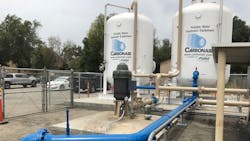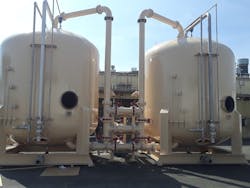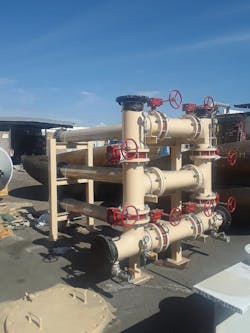Rubidoux water provider reaches successful TCP contamination settlement
Rubidoux Community Services District is among the latest water providers to hold chemical manufacturing giants Dow Chemical and Shell Oil accountable for contaminating its drinking water with their products.
The district, located in northwestern Riverside County, provides water, wastewater collection and treatment, solid waste disposal, fire protection, and other services to a population of more than 35,000 within the City of Jurupa Valley.
It currently relies 100% on groundwater, which is pumped from six potable wells. Rubidoux, which has the distinction of having been California’s first community services district, serves mostly single-family households and businesses.
During routine water quality testing in 2017, Rubidoux discovered that its Wells #2 and #4 were contaminated with 1,2,3-Trichloropropane (TCP), a man-made chemical found as a by-product in certain pesticides. With TCP linked to cancer, the State of California has banned the chemical in drinking water above 5 parts per trillion (ppt).
The cost of removing TCP
TCP remediation is accomplished when contaminated water passes through the vessels and TCP adheres to the surface of the carbon granules, removing it from the water.
At first, the district was spending close to $100,000 a year to lease two granular activated carbon (GAC) filtration system vessels to remove TCP from the water. When Jeff Sims started at Rubidoux as the district’s Assistant General Manager in 2019, he made the decision to purchase the treatment vessels.
“Carbon change outs, staffing, energy and sampling of the two wells can run anywhere from $200,000-$250,000 annually. As the problem was not going away anytime soon it made sense to purchase our own equipment,” Sims said. Jeff became the district’s General Manager in early 2020.
Litigation
The district hadn’t considered suing the polluters until Ken Sansone, partner at SL Environmental Law Group reached out. It turned out that, due to California statutes of limitation, the district had only a few weeks left to file a lawsuit. Sims had to act fast.
Sims learned that SL Environmental specializes in water contamination cases and helped other water suppliers that he knew in nearby districts and cities.
“I made it through 26 years of working in the public sector, and 10+ years in private, and avoided lawsuits my entire career,” said Sims. “I’m not a litigious kind of guy, but when I spoke to other districts that I knew had worked with SL, we decided to seek Board authorization to file a suit.”
SL Environmental took on the case and helped Rubidoux identify the source of the contamination and hold the polluters accountable.
In January 2021, SL Environmental filed a complaint in federal district court against Dow Chemical and Shell Oil over TCP contamination. The complaint alleged that the companies knew, or should have known, that TCP from their products would pollute drinking water and “threaten the public health and welfare.”
The complaint describes TCP as “an inert ingredient, impurity and/or manufacturing by-product in certain soil fumigant products used to control nematodes (microscopic worms that infest plant roots) that were marketed primarily, although not exclusively, from the 1940s through the 1980s.”
Brian Laddusaw, the district’s Finance Director, worked with Sansone to determine the cost of removing the TCP to date and also the future operational costs of the 20,000 gallon GAC treatment vessels. In September 2022, a settlement was agreed upon.
Sims agreed, adding that the settlement helped protect Rubidoux customers from significant rate hikes.
“We typically review our rates at 5-year intervals,” Sims said. “The last time we did this we did not know about TCP and PFAS contamination, so we didn’t factor in the extensive treatment costs. Fortunately, we had some reserves to buffer the initial impact, but without the settlement we would not have been able to keep our rates where they were until our next review.”
A multidistrict litigation
SL Environmental is now also representing Rubidoux in multi-district litigation (MDL-2873) against DuPont, 3M and other manufacturers over per- and polyfluoroalkyl substances, or PFAS, that have also contaminated its water supplies. Rubidoux has joined over two thousand plaintiffs, including other water providers, state agencies, and property owners affected by PFAS in a consolidated multidistrict litigation (MDL) that is being heard in the Federal District Court of South Carolina.
MDLs are used to coordinate complex litigation filed in multiple federal district courts by similar parties. By consolidating the discovery and pretrial motions, both sides save time and money. If preliminary cases are resolved in favor of the plaintiffs, that can result in a domino effect of settlements for the remaining cases. Typically, the presiding judge will then steer the parties toward an agreeable resolution with a national settlement.
Unlike a class action lawsuit, an MDL settlement is not binding on any party without its agreement to participate. If a case is not settled during an MDL, it is sent back to the original court for trial, meaning there is no downside to joining the MDL and any plaintiff can still pursue a different outcome if it chooses.
SL Environmental represents the district on a contingency fee basis, which means that a fee is only due if the case achieves a favorable result. Other costs, like collecting data and hiring expert witnesses, are also fronted by the firm.
The MDL started in January 2019 and the first cases are set to go to trial in June of 2023. While things are moving quickly, it is not too late for systems that have per- and polyfluoroalkykl substances (PFAS) in their water, at any level, to join the MDL, and it is likely the quickest route to a settlement for utilities dealing with these two most commonly found forms of PFAS.
“The treatment costs for PFAS are more extensive than TCP, partly because the demand for the infrastructure has risen so quickly as PFAS is fast becoming a big national issue,” said Laddusaw. “Consequently, the outcome of this MDL is very important for small districts like ours and we feel confident that we have the right legal representation on our side.”
About the Author
Valentina Marastoni-Bieser
Valentina Marastoni-Bieser is the vice president of client engagement for SL Environmental Law Group.


